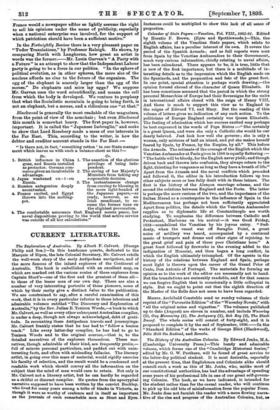CURRENT LITERATURE.
The Exploration of Australia. By Albert F. Calvert. (George Philip and Son.)—In this handsome quarto, dedicated to the Marquis of Ripon, the late Colonial Secretary, Mr. Calvert retells the well-worn story of the early Antipodean navigators, and of the more famous of the inland explorers of the Continent of Australia. The book is embellished with an excellent map, on which are marked out the various routes of these explorers from Captain Sturt's—one of the first and the greatest of them all— to those of the lesser men of our own day. There are also a number of very interesting portraits of these pioneers, some of which by their rarity give a distinct value to the publication. We are constrained to say, after a careful examination of this work, that it is in every particular inferior to those laborious and admirable volumes entitled "The Discovery and Exploration of Australia," by the Rev. Julian E. Tenison Woods,—a book to which Mr. Calvert, as well as every other subsequent Australian compiler, is under a deep, though not always acknowledged, debt of grati- tude. In recounting these Antipodean travels and journeyings, Mr. Calvert frankly states that he has had to " follow a beaten track." Like every latter-day compiler, he has had to go to Tenison Woods and to the original sources,—that is, to the detailed narratives of the explorers themselves. These nar- ratives, though admirable of their kind, are frequently prolix,— full of minute personal particulars, and padded out with unin- teresting facts, and often with misleading fallacies. The literary artist, in going over this mass of material, would rigidly exercise his faculty of selection, and the result would be a condensed and readable work which should convey all the information on the subject that the mind of man would care to retain. Not only is Mr. Calvert not a literary artist, but he can hardly be regarded as a skilful or discreet compiler. He quotes from the apocryphal narrative supposed to have been written by the convict Buckley, who lived for many years among a tribe of blacks in Victoria, as though it were as worthy of credence and in itself as important as the journals of such remarkable men as Start and Eyre.
Instances could be multiplied to show this lack of all sense of proportion.


































 Previous page
Previous page